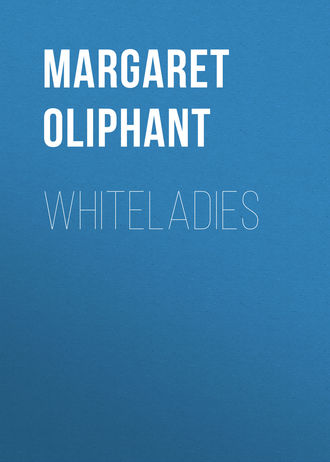
Маргарет Олифант
Whiteladies
CHAPTER XVIII
MADAME DE MIRFLEUR had more anxieties connected with her first family than merely the illness of her son; she had also the fate of her daughter to think of, and I am not sure that the latter disquietude did not give her the most concern. Herbert, poor boy, could but die, which would be a great grief, but an end of all anxiety, whereas Reine was likely to live, and cause much anxiety, unless her future was properly cared for. Reine’s establishment in life had been a very serious thought to Madame de Mirfleur since the girl was about ten years old, and though she was only eighteen as yet, her mother knew how negligent English relatives are in this particular, leaving a girl’s marriage to chance, or what they are pleased to call Providence, or more likely her own silly fancy, without taking any trouble to establish her suitably in life. She had thought much, very much of this, and of the great unlikelihood, on the other hand, of Reine, with her English ways, submitting to her mother’s guidance in so important a matter, or accepting the husband whom she might choose; and if the girl was obstinate and threw herself back, as was most probable, on the absurd laisser-aller of the English, the chances were that she would never find a proper settlement at all. These thoughts, temporarily suspended when Herbert was at his worst, had come up again with double force as she ceased to be completely occupied by him; and when she found Everard with his cousins, a new impulse was given to her imagination. Madame de Mirfleur had known Everard more or less since his boyhood; she liked him, for his manners were always pleasant to women. He was of suitable age, birth, and disposition; and though she did not quite know the amount of his means, which was the most important preliminary of all, he could not be poor, as he was of no profession, and free to wander about the world as only rich young men can do. Madame de Mirfleur felt that it would be simply criminal on her part to let such an occasion slip. In the intervals of their nursing, accordingly, she sought Everard’s company, and had long talks with him when no one else was by. She was a pretty woman still, though she was Reine’s mother, and had all the graces of her nation, and that conversational skill which is so thoroughly French; and Everard, who liked the society of women, had not the least objection on his side to her companionship. In this way she managed to find out from him what his position was, and to form a very good guess at his income, and to ascertain many details of his life, with infinite skill, tact, and patience, and without in the least alarming the object of her study. She found out that he had a house of his own, and money enough to sound very well, indeed, if put into francs, which she immediately did by means of mental calculations, which cost her some time and a considerable effort. This, with so much more added to it, in the shape of Reine’s dot, would make altogether, she thought, a very pretty fortune; and evidently the two were made for each other. They had similar tastes and habits in many points; one was twenty-five, the other eighteen; one dark, the other fair; one impulsive and high-spirited, with quick French blood in her veins, the other tranquil, with all the English ballast necessary. Altogether, it was such a marriage as might have been made in heaven; and if heaven had not seen fit to do it, Madame de Mirfleur felt herself strong enough to remedy this inadvertence. It seemed to her that she would be neglecting her chief duty as Reine’s mother if she allowed this opportunity to slip through her hands. To be sure, it would have been more according to les convenances, had there been a third party at hand, a mutual friend to undertake the negotiation; but, failing any one else, Madame de Mirfleur felt that, rather than lose such an “occasion,” she must, for once, neglect the convenances, and put herself into the breach.
“I do not understand how it is that your friends do not marry you,” she said one day when they were walking together. “Ah, you laugh, Monsieur Everard. I know that is not your English way; but believe me, it is the duty of the friends of every young person. It is a dangerous thing to choose for yourself; for how should you know what is in a young girl? You can judge by nothing but looks and outside manners, which are very deceitful, while a mother or a judicious friend would sound her character. You condemn our French system, you others, but that is because you don’t know. For example, when I married my present husband, M. de Mirfleur, it was an affair of great deliberation. I did not think at first that his property was so good as I had a right to expect, and there was some scandal about his grandparents, which did not quite please me. But all that was smoothed away in process of time, and a personal interview convinced me that I should find in him everything that a reasonable woman desires. And so I do; we are as happy as the day. With poor Herbert’s father the affair was very different. There was no deliberation – no time for thought. With my present experience, had I known that daughters do not inherit in England, I should have drawn back, even at the last moment. But I was young, and my friends were not so prudent as they ought to have been, and we did what you call fall in love. Ah! it is a mistake! a mistake! In France things are a great deal better managed. I wish I could convert you to my views.”
“It would be very easy for Madame de Mirfleur to convert me to anything,” said Everard, with a skill which he must have caught from her, and which, to tell the truth, occasioned himself some surprise.
“Ah, you flatter!” said the lady; “but seriously, if you will think of it, there are a thousand advantages on our side. For example, now, if I were to propose to you a charming young person whom I know – not one whom I have seen on the surface, but whom I know au fond, you understand – with a dot that would be suitable, good health, and good temper, and everything that is desirable in a wife? I should be sure of my facts, you could know nothing but the surface. Would it not then be much better for you to put yourself into my hands, and take my advice?”
“I have no doubt of it,” said Everard, once more gallantly; “if I wished to marry, I could not do better than put myself in such skilful hands.”
“If you wished to marry – ah, bah! if you come to that, perhaps there are not many who wish to marry, for that sole reason,” said Madame de Mirfleur.
“Pardon me; but why then should they do it?” said Everard.
“Ah, fie, fie! you are not so innocent as you appear,” she said.
“Need I tell to you the many reasons? Besides, it is your duty. No man can be really a trustworthy member of society till he has married and ranged himself. It is clearly your duty to range yourself at a certain time of life, and accept the responsibilities that nature imposes. Besides, what would become of us if young men did not marry? There would be a mob of mauvais sujets, and no society at all. No, mon ami, it is your duty; and when I tell you I have a very charming young person in my eye – ”
“I should like to see her very much. I have no doubt your taste is excellent, and that we should agree in most points,” said Everard, with a laugh.
“Perhaps,” said Madame de Mirfleur, humoring him, “a very charming young person,” she added, seriously, “with, let us say, a hundred and fifty thousand francs. What would you say to that for the dot?”
“Exactly the right sum, I have no doubt – if I had the least notion how much it was,” said Everard, entering into the joke, as he thought; “but, pardon my impatience, the young person herself – ”
“Extremely comme il faut,” said the lady, very gravely. “You may be sure I should not think of proposing any one who was not of good family; noble, of course; that is what you call gentlefolks – you English. Young – at the most charming age indeed – not too young to be a companion, nor too old to adapt herself to your wishes. A delightful disposition, lively – a little impetuous, perhaps.”
“Why this is a paragon!” said Everard, beginning to feel a slight uneasiness. He had not yet a notion whom she meant; but a suspicion that this was no joke, but earnest, began to steal over his mind: he was infinitely amused; but notwithstanding his curiosity and relish of the fun, was too honorable and delicate not to be a little afraid of letting it go too far. “She must be ugly to make up for so many virtues; otherwise how could I hope that such a bundle of excellence would even look at me?”
“On the contrary, there are many people who think her pretty,” said Madame de Mirfleur; “perhaps I am not quite qualified to judge. She has charming bright eyes, good hair, good teeth, a good figure, and, I think I may say, a very favorable disposition, Monsieur Everard, toward you.”
“Good heavens!” cried the young man; and he blushed hotly, and made an endeavor to change the subject. “I wonder if this Kanderthal is quite the place for Herbert,” he said hastily; “don’t you think there is a want of air? My own opinion is that he would be better on higher ground.”
“Yes, probably,” said Madame de Mirfleur, smiling. “Ah, Monsieur Everard, you are afraid; but do not shrink so, I will not harm you. You are very droll, you English – what you call prude. I will not frighten you any more; but I have a regard for you, and I should like to marry you all the same.”
“You do me too much honor,” said Everard, taking off his hat and making his best bow. Thus he tried to carry off his embarrassment; and Madame de Mirfleur did not want any further indication that she had gone far enough, but stopped instantly, and began to talk to him with all the ease of her nation about a hundred other subjects, so that he half forgot this assault upon him, or thought he had mistaken, and that it was merely her French way. She was so lively and amusing, indeed, that she completely reassured him, and brought him back to the inn in the best of humors with her and with himself. Reine was standing on the balcony as they came up, and her face brightened as he looked up and waved his hand to her. “It works,” Madame de Mirfleur said to herself; but even she felt that for a beginning she had said quite enough.
In a few days after, to her great delight, a compatriot – a gentleman whom she knew, and who was acquainted with her family and antecedents – appeared in the Kanderthal, on his way, by the Gemmi pass, to the French side of Switzerland. She hailed his arrival with the sincerest pleasure, for, indeed, it was much more proper that a third party should manage the matter. M. de Bonneville was a gray-haired, middle-aged Frenchman, very straight and very grave, with a grizzled moustache and a military air. He understood her at a word, as was natural, and when she took him aside and explained to him all her fears and difficulties about Reine, and the fearful neglect of English relations, in this, the most important point in a girl’s life, his heart was touched with admiration of the true motherly solicitude thus confided to him.
“It is not, perhaps, the moment I would have chosen,” said Madame de Mirfleur, putting her handkerchief to her eyes, “while my Herbert is still so ill; but what would you, cher Baron? My other child is equally dear to me; and when she gets among her English relations, I shall never be able to do anything for my Reine.”
“I understand, I understand,” said M. de Bonneville; “believe me, dear lady, I am not unworthy of so touching a confidence. I will take occasion to make myself acquainted with this charming young man, and I will seize the first opportunity of presenting the subject to him in such a light as you would wish.”
“I must make you aware of all the details,” said the lady, and she disclosed to him the amount of Reine’s dot, which pleased M. de Bonneville much, and made him think, if this negotiation came to nothing, of a son of his own, who would find it a very agreeable addition to his biens. “Decidedly, Mademoiselle Reine is not a partie to be neglected,” he said, and made a note of all the chief points. He even put off his journey for three or four days, in order to be of use to his friend, and to see how the affair would end.
From this time Everard found his company sought by the new-comer with a persistency which was very flattering. M. de Bonneville praised his French, and though he was conscious he did not deserve the praise, he was immensely flattered by it; and his new friend sought information upon English subjects with a serious desire to know, which pleased Everard still more. “I hope you are coming to England, as you want to know so much about it,” he said, in an Englishman’s cordial yet unmannerly way.
“I propose to myself to go some time,” said the cautious Baron, thinking that probably if he arranged this marriage, the grateful young people might give him an invitation to their château in England; but he was very cautious, and did not begin his attack till he had known Everard for three days at least, which, in Switzerland, is as good as a friendship of years.
“Do you stay with your cousins?” he said one day when they were walking up the hillside on the skirts of the Gemmi. M. de Bonneville was a little short of breath, and would pause frequently, not caring to confess this weakness, to admire the view. The valley lay stretched out before them like a map, the snowy hills retiring at their right hand, the long line of heathery broken land disappearing into the distance on the other, and the village, with its little bridge and wooden houses straggling across its river. Herbert’s wheeled chair was visible on the road like a child’s toy, Reine walking by her brother’s side. “It is beautiful, the devotion of that charming young person to her brother,” M. de Bonneville said, with a sudden burst of sentiment; “pardon me, it is too much for my feelings! Do you mean to remain with this so touching group, Monsieur Austin, or do you proceed to Italy, like myself?”
“I have not made up my mind,” said Everard. “So long as I can be of any use to Herbert, I will stay.”
“Poor young man! it is to be hoped he will get better, though I fear it is not very probable. How sad it is, not only for himself, but for his charming sister! One can understand Madame de Mirfleur’s anxiety to see her daughter established in life.”
“Is she anxious on that subject?” said Everard, half laughing. “I think she may spare herself the trouble. Reine is very young, and there is time enough.”
“That is one of the points, I believe, on which our two peoples take different views,” said M. de Bonneville, good-humoredly. “In France it is considered a duty with parents to marry their children well and suitably – which is reasonable, you will allow, at least.”
“I do not see, I confess,” said Everard, with a little British indignation, “how, in such a matter, any one man can choose for another. It is the thing of all others in which people must please themselves.”
“You think so? Well,” said M. de Bonneville, shrugging his shoulders, “the one does not hinder the other. You may still please yourself, if your parents are judicious and place before you a proper choice.”
Everard said nothing. He cut down the thistles on the side of the road with his cane to give vent to his feelings, and mentally shrugged his shoulders too. What was the use of discussing such a subject with a Frenchman? As if they could be fit to judge, with their views!
“In no other important matter of life,” said M. de Bonneville, insinuatingly, “do we allow young persons at an early age to decide for themselves; and this, pardon me for saying so, is the most impossible of all. How can a young girl of eighteen come to any wise conclusion in a matter so important? What can her grounds be for forming a judgment? She knows neither men nor life; it is not to be desired that she should. How then is she to judge what is best for her? Pardon me, the English are a very sensible people, but this is a bêtise: I can use no other word.”
“Well, sir,” said Everard, hotly, with a youthful blush, “among us we still believe in such a thing as love.”
“Mon jeune ami,” said his companion, “I also believe in it; but tell me, what is a girl to love who knows nothing? Black eyes or blue, light hair or dark, him who valses best, or him who sings? What does she know more? what do we wish the white creature to know more? But when her parents say to her – ‘Chérie, here is some one whom with great care we have chosen, whom we know to be worthy of your innocence, whose sentiments and principles are such as do him honor, and whose birth and means are suitable. Love him if you can; he is worthy’ – once more pardon me,” said M. de Bonneville, “it seems to me that this is more accordant with reason than to let a child decide her fate upon the experience of a soirée du bal. We think so in France.”
Everard could not say much in reply to this. There rose up before him a recollection of Kate and Sophy mounted high on Dropmore’s drag, and careering over the country with that hero and his companions under the nominal guardianship of a young matron as rampant as themselves. They were perfectly able to form a judgment upon the relative merits of the Guardsmen; perfectly able to set himself aside coolly as nobody; which was, I fear, the head and front of their offending. Perhaps there were cases in which the Frenchman might be right.
“The case is almost, but I do not say quite, as strong with a young man,” said M. de Bonneville. “Again, it is the experience of the soirée du bal which you would trust to in place of the anxious selection of friends and parents. A young girl is not a statue to be measured at a glance. Her excellences are modest,” said the mutual friend, growing enthusiastic. “She is something cachée, sacred; it is but her features, her least profound attractions, which can be learned in a valse or a party of pleasure. Mademoiselle Reine is a very charming young person,” he continued in a more business-like tone. “Her mother has confided to me her anxieties about her. I have a strong inclination to propose to Madame de Mirfleur my second son, Oscar, who, though I say it who should not, is as fine a young fellow as it is possible to see.”
Everard stopped short in his walk, and looked at him menacingly, clenching his fist unawares. It was all he could do to subdue his fury and keep himself from pitching the old match-maker headlong down the hill. So that was what the specious old humbug was thinking of? His son, indeed; some miserable, puny Frenchman – for Reine! Everard’s blood boiled in his veins, and he could not help looking fiercely in his companion’s face; he was speechless with consternation and wrath. Reine! that they should discuss her like a bale of goods, and marry her perhaps, poor little darling! – if there was no one to interfere.
“Yes,” said M. de Bonneville, meditatively. “The dot is small, smaller than Oscar has a right to expect; but in other ways the partie is very suitable. It would seal an old friendship, and it would secure the happiness of two families. Unfortunately the post has gone to-day, but to-morrow I will write to Oscar and suggest it to him. I do not wish for a more sweet daughter-in-law than Mademoiselle Reine.”
“But can you really for a moment suppose that Reine – !” thundered forth the Englishman. “Good heavens! what an extraordinary way you have of ordering affairs! Reine, poor girl, with her brother ill, her heart bursting, all her mind absorbed, to be roused up in order to have some fine young gentleman presented to her! It is incredible – it is absurd – it is cruel!” said the young man, flushed with anger and indignation. His companion while he stormed did nothing but smile.
“Cher Monsieur Everard,” he said, “I think I comprehend your feelings. Believe me, Oscar shall stand in no one’s way. If you desire to secure this pearl for yourself, trust to me; I will propose it to Madame de Mirfleur. You are about my son’s age; probably rich, as all you English are rich. To be sure, there is a degree of relationship between you; but then you are Protestants both, and it does not matter. If you will favor me with your confidence about preliminaries, I understand all your delicacy of feeling. As an old friend of the family I will venture to propose it to Madame de Mirfleur.”
“You will do nothing of the kind,” said Everard furious. “I – address myself to any girl by a go-between! I – insult poor Reine at such a moment! You may understand French delicacy of feeling, M. de Bonneville, but when we use such words we English mean something different. If any man should venture to interfere so in my private affairs – or in my cousin’s either for that matter – ”
“Monsieur Everard, I think you forgot yourself,” said the Frenchman with dignity.
“Yes; perhaps I forget myself. I don’t mean to say anything disagreeable to you, for I suppose you mean no harm; but if a countryman of my own had presumed – had ventured – . Of course I don’t mean to use these words to you,” said Everard, conscious that a quarrel on such a subject with a man of double his age would be little desirable; “it is our different ways of thinking. But pray be good enough, M. de Bonneville, to say nothing to Madame de Mirfleur about me.”
“Certainly not,” said the Frenchman with a smile, “if you do not wish it. Here is the excellence of our system, which by means of leaving the matter in the hands of a third party, avoids all offence or misunderstanding. Since you do not wish it, I will write to Oscar to-night.”
Everard gave him a look, which if looks were explosive might have blown him across the Gemmi. “You mistake me,” he said, not knowing what he said; “I will not have my cousin interfered with, any more than myself – ”
“Ah, forgive me! that is going too far,” said the Frenchman; “that is what you call dog in the manger. You will not eat yourself, and you would prevent others from eating. I have her mother’s sanction, which is all that is important, and my son will be here in three days. Ah! the sun is beginning to sink behind the hills. How beautiful is that rose-flush on the snow! With your permission I will turn back and make the descent again. The hour of sunset is never wholesome. Pardon, we shall meet at the table d’hôte.”
Everard made him the very slightest possible salutation, and pursued his walk in a state of excitement and rage which I cannot describe. He went miles up the hill in his fervor of feeling, not knowing where he went. What! traffic in Reine – sell Reine to the best bidder; expose her to a cold-blooded little beast of a Frenchman, who would come and look at the girl to judge whether he liked her as an appendage to her dot! Everard’s rage and dismay carried him almost to the top of the pass before he discovered where he was.







